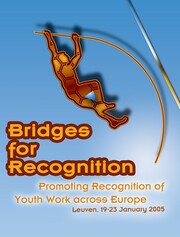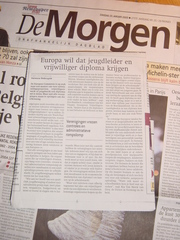Press Information
Bridges for Recognition Press Conference
Press and media is invited for a Press Conference at Bridges for Recognition on Thursday 20 January 2005 10.30h at the Faculty Club, Leuven, Belgium with possibility to interview and photograph:
- Pierre Mairesse (Director Youth, Civil Society & Communication, Directorate General Education and Culture, European Commission)
- Peter Lauritzen (Director European Youth Centre, Directorate of Youth and Sport, Council of Europe)
- Bettina Schwarzmayr (Board Member of the European Youth Forum)
- Tony Geudens (Event Manager Bridges for Recognition, SALTO-YOUTH.net)
- Egemen Özyay (young person for whom a Youth Activity changed his life)
All these people will be speaking in the opening session of Bridges for Recognition on Thursday 20 January 2005 from 9am till 10.30h, which you are welcome to join. (see programme or download it below)
^^ top ^^
Some Facts!
Bridges for Recognition is a European event taking place in Leuven, Belgium from 19-23 January 2005 which aims at…
- promoting the recognition of young people’s skills and learning through participation in youth work activities
- raising the visibility of youth work and its impact
- enhancing the social recognition of youth work in society
Bridges for Recognition consists of a three day programme with animated debates, panel discussions, presentations of no less than 16 good practices in recognition. Find a more detailed programme at www.SALTO-YOUTH.net/BridgesProgramme/.
Bridges for Recognition will host over 120 participants representing non-formal and formal education, youth work, European institutions, national governments, local authorities and social partners from the labour market; to discuss expectations, opportunities and concrete actions in the field of recognition.
Bridges for Recognition Is also a virtual conference. All interested people can participate in Bridges for Recognition online via the online Bridges Virtual Community or via a Webcam connection. Read more under www.SALTO-YOUTH.net/BridgesVirtual/.
Bridges for Recognition is organised by the SALTO-YOUTH Inclusion Resource Centre (Belgium Flanders) and jointly funded by the European Commission, the Council of Europe and the Flemish Community.
^^ top ^^
Bridges for Recognition Background
Almost half of the over 75 million young people in Europe (between 15-25)actively participate in a wide variety of organisations and associations (youth, cultural, sports, religious…) . Often it is forgotten that through participation in youth activities or taking on responsibilities within these organisations, young people gain valuable skills and competences.
-
“ It is through organising activities in the local youth club that I actually learned how to set up projects from beginning to end, making sure to have money but also people on board, and work with them responsibly. If it wasn’t for being active in the youth club, I would never be where I am now, organising a conference on the recognition of non-formal learning.”
Tony Geudens (Belgium)– Event Manager Bridges for Recognition -
“ It is not easy to find a good job. In my European Voluntary Service in a social housing project in Manchester, I had the chance to do a photography project with the children, which gave me inspiration to start my vocational training in the graphic sector. But this was not all what I learned: I am now fluent in English, more open minded and self confident. ”
Egemen Özyay (Germany) – Trainee Graphic Company -
Both Egemen Özyay and Tony Geudens will be present at the
Bridges press conference on Thursday 20 January 2005 at 10.30h
^^ top ^^
Bridges for Recognition – What?
Bridges for Recognition brings together different stakeholders in the recognition debate (education sector, labour market, policy makers and youth work) in order to build bridges between those sectors and create smoother roads between different types of learning and opportunities created by them.
-
Politicians realise that people don’t only learn in schools but also in youth work
-
Schools are diversifying their methods and get inspired by non-formal learning
-
Employers are looking for competencies which are explored in youth activities
-
Youth work realises that they can make a contribution to the knowledge society
-
Young people want to take advantage of the competences they gained
Many recognition procedures have been set up by a variety of organisations and institutions to make the learning from youth activities visible - in order to use these competencies in shortcuts into formal education, to find a job or to get to know and develop oneself.
-
e.g. Finnish young people can record all their youth activities and what they learned in a Recreational Activity Booklet, signed by the youth worker, and get credits for it in some schools.
-
e.g. every French citizen has the right to have their competence profile measured in an accredited centre and use this to find a job
-
e.g. the Council of Europe is working on a Youth Worker Portfolio to document a youth worker’s experiences and achievements against predetermined quality standards.
Representatives of these and other Recognition procedures are present at Bridges for Recognition and could be available for more information.
^^ top ^^
Downloads
The following downloads are available:
- Bridges for Recognition Press Release
Find all the background information in a short overview - plus an invitation for the Press Confernce for interested press and media - many interview and picture possibilities - contact Tony Geudens at +32-22090720 for more information.
- Bridges for Recognition Programme
This is the programme of Bridges for Recognition with details of all the different workshops and sessions. Download it now - and follow all discussions in room 'Willem Van Croy' via the Bridges Webcam (add BridgesBelgium as your friend in Yahoo Messenger)
- Bridges for Recognition Presentation Document
A short introduction to what Bridges for Recognition wants to achieve, what methods it will use and how you still can participate.
- Article Recognition De Morgen
An article that appeared in the Flemish Belgian newspaper the Morgen regarding the recognition of volunteering.

